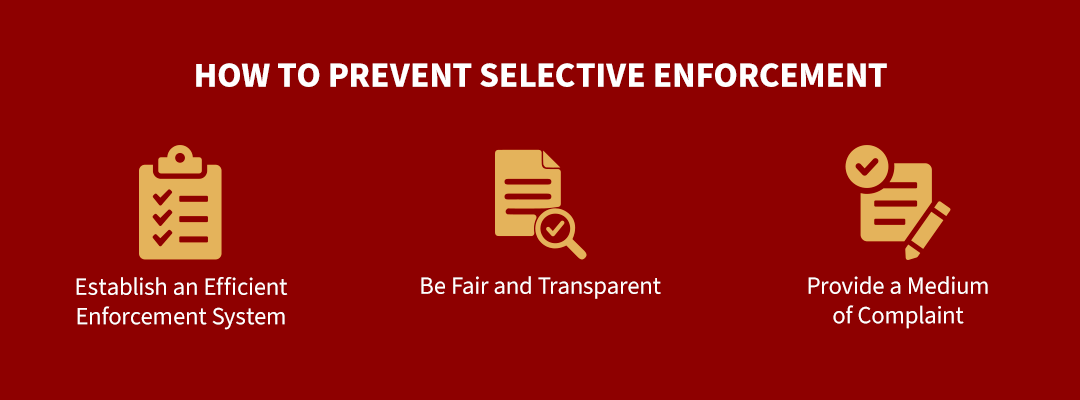Homeowners associations (HOAs) enforce the bylaws, covenants, conditions, and restrictions (CC&Rs) in residential communities. However, there are times when the HOA board applies the laws unfairly against specific individuals and groups. In those instances, the affected residents may have a claim against the HOA.
This guide discusses selective enforcement in detail, including tips for resolving such issues. Note that the principles discussed in this article also apply to condominiums and the condominium owners association (COA).
What Is HOA Selective Enforcement?
Selective enforcement is the unfair and discriminatory application of HOA rules against particular residents. In other words, selective enforcement occurs when the HOA board members enforce the rules against specific homeowners while treating others differently. For example, the HOA may fine one homeowner for leaving their holiday lights up too long while allowing other homeowners to keep their lights up with no penalties. This could be selective enforcement.
Whether or not the HOA is liable for selective enforcement depends on the facts of the case, making it complicated for most people. An attorney can examine your case and provide tailored advice and representation. Considering the sensitivity and seriousness of such cases, adequate preparation is crucial before taking any step.
Common Examples or Signs of Selective Enforcement by HOAs
Selective enforcement can be a contentious issue. Knowing some common signs can help you better assess the situation. The following could be indications of selective enforcement by the HOA:
- Inconsistent enforcement: This occurs when the HOA enforces the rules against some residents while disregarding others for similar violations.
- Targeting specific individuals: This occurs when the HOA consistently targets specific residents or groups within the community while ignoring others.
- Retroactive enforcement: This occurs when the HOA enforces the rules retroactively against certain residents for previously overlooked actions.
- Inappropriate fines and penalties: Sometimes, the HOA imposes harsher fines and penalties on some residents compared to others for similar violations.
- Selective response to complaints: Another common sign is when the HOA addresses complaints or concerns from some residents promptly while delaying or ignoring those from others.
- Lack of transparency: This occurs when the HOA is not transparent about why it makes certain decisions against specific individuals.
- Personal bias: In some cases, enforcement decisions seem influenced by personal relationships and prejudices instead of objectively applying the rules.
- Excessive scrutiny: When the HOA subjects particular residents to excessive scrutiny or frequent inspections compared to others in the community, that could suggest selective enforcement.
- Failure to follow procedures: Some HOAs ignore established procedures or bylaws when enforcing rules, leading to arbitrary decisions.
- Inflexibility: Some HOAs refuse to consider extenuating circumstances or make exceptions for valid reasons when enforcing rules against certain residents.
Be sure to document these occurrences as much as possible — gathering evidence is crucial to substantiating your claim.
Is HOA Selective Enforcement Illegal?
Selective enforcement is generally unlawful, but you should consider several factors. The first thing to do is review the content of the governing documents, such as bylaws and CC&Rs, which outline the rules and procedures for enforcement.
You should also review the relevant federal and state laws. While there may not be a specific HOA selective enforcement law, laws addressing issues like discrimination may apply. A classic example is the Fair Housing Act (FHA).
You also need to understand the potentially selective act in question. What did the HOA do? Is it a one-time occurrence or repetitive conduct? Does evidence support the claim? Answering these questions can provide perspective.
Can You Sue the HOA for Selective Enforcement?
You may sue the HOA for selective enforcement if you have a valid claim. To be successful, you must demonstrate the following:
- You are a member of the residential community.
- The HOA is responsible for enforcing the rules.
- The HOA is enforcing the rules in a discriminatory, arbitrary, or unreasonable manner.
Before initiating the lawsuit, it could help to try resolving the issue with the HOA. You may file the lawsuit if that is unsuccessful. In both cases, it could be best to hire an attorney who has handled similar cases and can provide tailored legal support.
What Are the Implications of Selective Enforcement?
Selective enforcement of HOA rules can affect the community in various ways. Below are some key impacts:
- Division within the community: Selective enforcement can create divisions among the residents, leading to resentment, mistrust, and conflicts.
- Deterioration of trust: Selective enforcement undermines confidence in the HOA leadership. This can stall progress and development in the community.
- Drop in property value: Selective enforcement makes the community unattractive. This can drive investors and residents away, leading to a decrease in property value.
- Constant legal issues: Inconsistent enforcement of HOA rules can result in frequent legal challenges, which can cause instability and strain on community resources.
How to Prevent Selective Enforcement
HOAs can do many things to prevent selective enforcement and reduce its impacts. Below are three best practices to consider:
1. Establish an Efficient Enforcement System
The HOA should have a system or process for enforcing the rules, and the board must understand the rules and regulations stipulated in the governing documents. This system may include allowing the residents to explain themselves, issuing written warnings, and documenting the procedure. The HOA must strive to follow the established protocol at all times.
2. Be Fair and Transparent
The HOA board must handle cases fairly and transparently. Discriminatory conduct is the primary source of disputes. It’s crucial to avoid prejudice and actual or supposed bias. For example, members of the HOA board could recuse themselves if they have an interest in the matter. Additionally, the HOA should communicate clearly and consistently to avoid confusion.
3. Provide a Medium of Complaint
The HOA should have a medium to receive complaints and address them promptly. The complaint system should also get feedback from residents to help the HOA identify areas for improvement. This strategy can help the board address problems before they escalate.
How to Navigate Selective Enforcement Issues
Homeowners encountering selective enforcement issues can navigate them in the following ways:
- Document everything: Keep detailed records of all communications and enforcement actions.
- Seek support from neighbors: Consider working with neighbors with similar issues to address the challenge collectively. Presenting a united front to the HOA can be effective.
- Communicate with the HOA: Express your concerns to the HOA board. You may be able to resolve the dispute amicably.
- Consult an attorney immediately: Attorneys can provide tailored advice and dispute resolution services.
How Calabrese Law Associates Can Assist
Calabrese Law Associates provides various services regarding HOA selective enforcement. Our lawyers can examine the case to determine whether you have a valid claim or defense. In both instances, we can try to resolve the dispute amicably without going to court. Even if the case is already in court, we may help you settle if you act timely. Our attorneys have extensive trial experience and can represent you in court if necessary.
Why Trust Us?
We are the leading real estate law firm in Massachusetts. We have handled numerous cases involving disputes between homeowners and HOAs. Our attorneys are knowledgeable and have years of practical experience in such matters. We dedicate resources to understanding the situations and providing personalized and effective legal solutions. Our practical strategies allow us to achieve the best possible results.
In addition to our excellent track record, we aim to form long-standing relationships with our clients. We prioritize quality client experiences and find ways to give back to the community. Through our friendly yet efficient legal services, we have established strong bonds with individuals and organizations in the Greater Boston Area and beyond.
Lastly, the lawyers at our firm are ethical and direct. We are always honest and transparent, which has contributed to our winning several awards. Read the reviews and testimonials from our clients to learn more about us!
Contact Calabrese Law Associates for Professional Support
Calabrese Law Associates can provide ongoing support to prevent or reduce selective enforcement. We can also help you protect your interests when you encounter such issues. Our trained attorneys can take the load off your shoulders. Contact us today for professional assistance.
This publication and its contents are not to be construed as legal advice nor a recommendation to you as to how to proceed. Please consult with a local licensed attorney directly before taking any action that could have legal consequences. This publication and its content do not create an attorney-client relationship and are being provided for general informational purposes only.
Attorney Advertising. Prior results do not guarantee a similar outcome.





